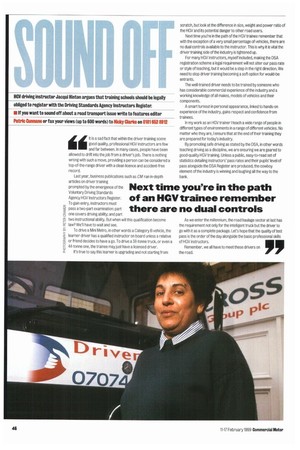HGV driving instructor Jacqui Hinton argues that training schools should
Page 48

If you've noticed an error in this article please click here to report it so we can fix it.
be legally obliged to register with the Driving Standards Agency Instructors Register.
• If you want to sound off about a road transport issue write to features editor Vatic Duman° or fax your views (up to 800 words) to Ilicbq Clarice on 0181652 8812 di It is a sad fact that within the driver training scene good quality, professional HGV instructors are few and far between. In many cases, people have been
allowed to drift into the job from a drivers job. There is nothing wrong with such a move, providing a person can be considered a top-of-the-range driver with a clean licence and accident-free record.
Last year, business publications such as CM ran in-depth articles on driver training prompted by the emergence of the Voluntary Driving Standards Agency HGV Instructors Register. To gain entry, instructors must pass a two-part examination: part one covers driving ability; and part two instructional ability. But when will this qualification become law? We'll have to wait and see.
To drive a Mini Metro, in other words a Category B vehicle, the learner driver has a qualified instructor on board unless a relative or friend deddes to have a go. To drive a 38-tonne truck, or even a 44-tonne one, the trainee may just have a licensed driver.
It's true to say this learner is upgrading and not starting from scratch, but look at the difference in size, weight and power ratio of the HGV and its potential danger to other road users.
Next time you're in the path of the HGV trainee remember that with the exception of a very small percentage of vehicles, there are no dual controls available to the instructor. This is why it is vital the driver training side of the industry is tightened up.
For many HGV instructors, myself included, making the DSA registration scheme a legal requirement will not alter our pass rate or style of teaching, but it would be a step in the right direction. We need to stop driver training becoming a soft option for would-be entrants.
The well-trained driver needs to be trained by someone who has considerable commercial experience of the industry and a working knowledge of all makes, models of vehicles and their components.
A smart turnout in personal appearance, linked to hands-on experience of the industry, gains respect and confidence from trainees.
In my work as an HGV trainer I teach a wide range of people in different types of environments in a range of different vehicles. No matter who they are, I ensure that at the end of their training they are prepared for today's industry.
By promoting safe driving as stated by the DSA, in other words teaching driving as a discipline, we are ensuring we are geared to good-quality HGV training. Unless a public, easy-to-read set of statistics detailing instructors' pass rates and their pupils' level of pass alongside the DSA Register are produced, the cowboy element of the industry is winning and laughing all the way to the hank.
As we enter the millennium, the road haulage sector at last has the requirement not only for the intelligent truck but the driver to go with it as a complete package. Let's hope that the quality of test pass is the order of the day alongside the basic professional skills of HGV instructors.
Remember, we all have to meet these drivers on the road.




































































































